- Home
- James Joyce
Stephen Hero Page 4
Stephen Hero Read online
Page 4
« The dawn awakes with tremulous alarms,
How grey, how cold, how bare!
O, hold me still white arms, encircling arms!
And hide me, heavy hair!
Life is a dream, a dream. The hour is done
And antiphon is said.
We go from the light and falsehood of the sun
To bleak wastes of the dead. »
Little by little Stephen became more irregular in his attendances at the college. He would leave his house every morning at the usual hour and come into the city on the tram. But always at Amiens St Station he would get down and walk and as often as not he would decide to follow some trivial indication of city life instead of entering the oppressive life of the College. He often walked thus for seven or eight hours at a stretch without feeling in the least fatigued. The damp Dublin winter seemed to harmonise with his inward sense of unreadiness and he did not follow the least of feminine provocations through tortuous, unexpected ways any more zealously than he followed through ways even less satisfying the nimble movements of the elusive one. What was that One: arms of love that had not love’s malignity, laughter running upon the mountains of the morning, an hour wherein might be encountered the incommunicable? And if the heart but trembled an instant at some approach to that he would cry, youthfully, passionately “It is so! It is so! Life is such as I conceive it.” He spurned from before him the stale maxims of the Jesuits and he swore an oath that [never] they should never establish over him an ascendancy. He spurned from before him a world of the higher culture in which there was neither scholarship nor art nor dignity of manners — a world of trivial intrigues and trivial triumphs. Above all he spurned from before him the company of [the] decrepit youth — and he swore an oath that never would they establish with him a compact of fraud. Fine words! fine oaths! crying bravely and passionately even in the teeth of circumstances. For not unfrequently in the pauses of rapture Dublin would lay a sudden hand upon his shoulder, « and the chill of the summons would strike to his heart. One day he passed on his homeward journey through Fairview. At the fork of the roads before the swampy beach a big dog was recumbent. From time to time he lifted his muzzle in the vapourous air, uttering a prolonged sorrowful howl. » People had gathered on the footpaths to hear him. [and] Stephen made one of them till he felt the first drops of rain, and then he continued his way in silence under the dull surveillance of heaven, hearing from time to time behind him the strange lamentation.
It was natural that the more the youth sought solitude for himself the more his society sought to prevent his purpose. Though he was still in his first year he was considered a personality and there were even many who thought that though his theories were a trifle ardent they were not without meaning. Stephen came seldom to lectures, prepared nothing and absented himself from term examinations and not merely was no remark passed on these extravagances but it was supposed probable that he represented really the artistic type and that he was, after the fashion of that little known tribe, educating himself. It must not be supposed that the popular University of Ireland lacked an intelligent centre. Outside the compact body of national « revivalists there were here and there students who had certain ideas of their own and were more or less tolerated by their fellows. » For instance there was a serious young feminist named McCann — a blunt brisk figure, wearing a Cavalier beard and shooting-suit, and a steadfast reader of the Review of Reviews. The students of the college did not understand what manner of ideas he favoured and they considered that they rewarded his originality sufficiently by calling him ‘Knickerbockers.’ There was also the College orator — a most amenable young man who spoke at all meetings. Cranly too was a personality and Madden had soon been recognised as the « spokesman » of the patriotic party. Stephen may be said to have occupied the position of notable-extraordinary: very few had ever heard of the writers he was reported to read and those who had knew them to be mad fellows. At the same time as Stephen’s manner was so unbending to all it was supposed that he had preserved his sanity entire and safely braved temptations. People began to defer to him, to invite him to their houses and to present serious faces to him. His were simply theories and, as he had as yet committed no breach of the law, he was respectfully invited to read a paper before the Literary and Historical Society of the College. The date was fixed for the end of March and the title of the paper was announced as ‘Drama and Life.’ Many risked the peril of rebuff to engage the young eccentric in talk but Stephen preserved a disdainful silence. One night as he was returning from a party a reporter of one of the Dublin papers, who had been introduced that evening to the prodigy, approached him and after a few exchanges said to him tentatively:
— I was reading of that writer … what’s this you call him … Maeterlinck the other day … you know?
— Yes …
— I was reading, The Intruder I think was the name of it … Very … curious play …
Stephen had no wish to talk to the man about Maeterlinck and on the other hand he did not like to offend by the silence which the remark and the tone and the intention all seemed to deserve so he cast about quickly in his mind for some noncommittal banality with which to pay the debt. At last he said:
— It would be hard to put it on the stage.
The journalist was quite satisfied at this exchange as if it was just this impression and no other which Maeterlinck’s play had produced upon him. He assented with conviction:
— O yes! … next to impossible …
Allusions of such a kind to what he held so dear at heart wounded Stephen deeply. It must be said simply and at once that at this time Stephen suffered the most enduring influence of his life. The spectacle of the world which his intelligence presented to him with every sordid and deceptive detail set side by side with the spectacle of the world which the monster in him, now grown to a reasonably heroic stage, presented also had often filled him with such sudden despair as could be assuaged only by melancholy versing. He had all but decided to consider the two worlds as aliens one to another — however disguised or expressed the most utter of pessimisms — when he encountered through the medium of hardly procured translations the spirit of Henrik Ibsen. He understood that spirit « instantaneously. » Some years before this same instantaneous understanding had occurred when he had read the very puzzled, apologetic account which Rousseau’s English biographer had « given of the young philosopher’s » stealing his mistress’s spoons and allowing a servant-girl to be accused of the theft at the very moment when he was beginning his struggle for Truth and Liberty. Just as then with the [perverted] perverse philosopher so now: Ibsen had no need of apologist or critic: the minds of the old Norse poet and of the perturbed young Celt met in a moment of radiant simultaneity. Stephen was captivated first by the evident excellence of the art: he was not long before he began to affirm, out of a sufficiently scanty knowledge of the tract, of course, that Ibsen was the first among the dramatists of the world. In translations of the Hindu or Greek or Chinese theatres he found only anticipations of or attempts and in the French classical, and the English romantic, theatres anticipations less distinct and attempts less successful. But it was not only this excellence which captivated him: it was not that which he greeted gladly with an entire joyful spiritual salutation. It was the very spirit of Ibsen himself that was discerned moving behind the impersonal manner of the artist: [Ibsen with his profound self-approval, Ibsen with his haughty, disillusioned courage, Ibsen with his minute and wilful energy.] a mind of sincere and boylike bravery, of disillusioned pride, of minute and wilful energy.* Let the world solve itself in whatsoever fashion it pleased, let its putative Maker justify Himself by whatsoever processes seemed good to Him, one could scarcely advance the dignity of the human attitude a step beyond this answer. Here and not in Shakespeare or Goethe was the successor to the first poet of the Europeans, here, as only to such purpose in Dante, a human personality had been found united with an artistic manner which was itself almost a natural phen
omenon: and the spirit of the time united one more readily with the Norwegian than with the Florentine.
The young men of the college had not the least idea who Ibsen was but from what they could gather here and there they surmised that he must be one of the « atheistic writers whom the papal secretary puts on the Index. It was a novelty to hear anyone mention such a name » in their college but as the professors gave no lead in condemnation they concluded that they had better wait. Meanwhile they were somewhat impressed: many now began to say that though Ibsen was immoral he was a great writer and one of the professors was heard to say that when he was in Berlin last summer on his holidays there had been a great deal of talk about some play of Ibsen’s which was being performed at one of the theatres. Stephen had begun to study Danish instead of preparing his course for the examination and this fact was magnified into a report that he was a competent Danish scholar. That youth was astute enough to profit by rumours which he took no trouble to contradict. He smiled to think that these people in their hearts feared him as an infidel and he marvelled at the quality of their supposed beliefs. Father Butt talked to him a great deal and Stephen was nothing loth to make « himself the herald » of a new order. He never spoke with heat and he argued always as if he did not greatly care which way the argument went, at the same time never losing a point. The Jesuits and their flocks may have said to themselves: the « youthful seeming-independent » we know, and the appeasable patriot we know, but what are you? They played up to him very well, « considering their disadvantages, and Stephen could not understand why they took the trouble to humour him. »
— Yes, yes, said Father Butt one day after one of these scenes, I see … I quite see your point … It would apply of course to the dramas of Turgénieff?
Stephen had read and admired certain translations of Turgénieff’s novels and stories and he asked therefore with a genuine note in his voice:
— Do you mean his novels?
— Novels, yes, said Father Butt swiftly, … his novels, to be sure … but of course they are dramas … are they not, Mr Daedalus?
Very often Stephen used to visit at a house in Donnybrook the atmosphere of which was compact of liberal patriotism and orthodox study. There were several marriageable daughters in the family and whenever any promise [was] on the part of a young student was signalled he was sure to receive an invitation to this house. The young feminist McCann was a constant visitor there and Madden used to visit occasionally. The father of the family was an elderly man who played chess on week evenings with his grown-up sons and assisted on Sunday evenings at a round of games and music. The music was supplied by Stephen. There was an old piano in the room and when the room was tired of games one of the daughters used to come over smilingly to Stephen and « ask him to sing them some of his beautiful songs. The keys of the piano were worn away and sometimes the notes would not sound but the tone was soft and mellow and Stephen used to sit down and sing his beautiful songs to the polite, tired, unmusical audience. » * The songs, for him at least, were really beautiful — the old country songs of England and the elegant songs of the Elizabethans. The ‘moral’ of these songs was sometimes a little dubious and Stephen’s ear used to catch at once the note of qualification in the applause that followed them. The studious daughters found these songs very quaint but Mr Daniel said that Stephen should sing operatic music if he wanted to have his voice heard properly. In spite of the entire absence of sympathy between this circle and himself Stephen was very much at ease in it and he was, as they bade him be, very much ‘at home’ as he sat on the sofa counting the lumps of horsehair with the ends of his « fingers, and listening to the conversation. » The young men and the daughters amused themselves tolerably under Mr Daniel’s eye but whenever there was an approach to artistic matters during the process of their games Stephen with egoistic humour imagined his presence acting as a propriety. He could see seriousness developing on the shrewd features of a young man who had to put a certain question to one of the daughters:
— I suppose it’s my turn now … Well … let me see … (and here he became as serious as a young man, who has been laughing very much for a full five minutes, can become) … Who is your favourite poet, Annie?
Annie thought for a few moments: there was a pause. Annie and the young man were ‘doing’ the same course.
—… German?
—… Yes.
Annie thought for another few moments while the table waited to be edified.
— I think … Goethe.
McCann used very often to organise « charades » in which he used to take the most violent parts. The charades were very farcical and everyone took his part with goodwill, Stephen as well as the others. Stephen would [play often] play his quiet deliberative manner off against McCann’s uproarious acting and for this reason the two were often ‘picked’ together. These charades wearied Stephen a little but McCann was very much given to organising them as he was of the opinion that amusement is necessary for the bodily welfare of mankind. The young feminist’s Northern accent always excited laughter and his face, adorned with its Cavalier beard, was certainly capable of brazen grimaces. In the college McCann [was] had never been assimilated on account of his ‘ideas’ but here he partook of the inner life of the family.* In this house it was the custom to call a young visitor « by his Christian name » a little too soon and though Stephen was spared the compliment, McCann was never spoken of as anything but ‘Phil.’ Stephen used to call him ‘Bonny Dundee’ nonsensically associating [the] his brisk name and his « brisk manners with the sound » of the line:
Come fill up my cup, come fill up my can.
Whenever the evening assumed the character of a serious affair Mr Daniel would be asked to recite something for the company. Mr Daniel had formerly been the manager of a theatre in Wexford and he had « often spoken at public meetings » through the country. He recited national pieces in a stern declamatory fashion amid attentive silence. The daughters also recited. During these recitations Stephen’s eye never moved from the picture of the Sacred Heart which hung right above the head of the reciter’s head. The Miss Daniels were not so imposing as their father and their dress was [word crossed out so as to be illegible] somewhat colleen. « Jesus, moreover, exposed » his heart somewhat too obviously in the cheap print: and Stephen’s thoughts were usually fascinated to a pleasant stupor by these twin futilities. A parliamentary charade was frequent. Mr Daniel had sat for his county some years before and for this reason he was chosen to impersonate the Speaker of the House. McCann always represented a member of the Opposition and he spoke point-blank. Then a member would protest and there would be a make-believe of parliamentary manners.
— Mr Speaker, I must ask …
— Order! Order!
— You know it’s a lie!
— You must withdraw, Sir.
— As I was saying before the honourable gentleman interrupted we must …
— I won’t withdraw.
— I must ask honourable members to preserve order in the House.
— I won’t withdraw.
— Order! Order!
Another favourite was “Who’s Who.” A person goes out of the room and the rest of the company choose the name of someone who is supposed to have special attractions for the absent player. This latter, when he returns to the company, has to ask questions all round and try to guess the name. This game was generally used to the discomfiture of the young male guests for the manner in which it was played suggested that each young student had an affair of the heart with some young lady within tolerable distance of him: but the young men, who were at first surprised by these implications, ended by looking as if they thought that the sagacity of the other players had just forestalled them in an unexpected, not unpleasant, discovery. No such suggestion could be seriously made by the company to fit Stephen’s case and so the first time he played the game they chose differently for him. The [company was] players were unable to answer his questions when he returned to the
room: such questions as: “Where does the person live?” “Is the person married or single?” “What age is the person?” could not be answered by the circle until McCann had been consulted in a swift undertone. The answer “Norway” gave Stephen the clue at once and so the game ended and the company proceeded to divert themselves as before this serious interruption. Stephen sat down beside one of the daughters and, while admiring the rural comeliness of her features, waited quietly for her first word which, he knew, would destroy his satisfaction. Her large handsome eyes looked at him for a while as if they were « about to trust him » and then she said:
— How did you guess it so quickly?
— I knew you meant him. But you’re wrong about his age.
Others had heard this: but she was impressed by a possible vastness of the unknown, complimented to confer with one who confened directly with the exceptional. She leaned forward to speak with soft seriousness.
— Why, how old is he?
— Over seventy.
— Is he?
Stephen now imagined that he had explored this region sufficiently and he would have discontinued his visits had not two causes induced him to continue. The first cause was the unpleasant character of his home and the second was the curiosity occasioned by the advent of a new figure. One evening while he was musing on the horsehair sofa he heard his name called and stood up to be introduced. A dark « full-figured » girl was standing before him and, without waiting for Miss Daniel’s introduction, she said:

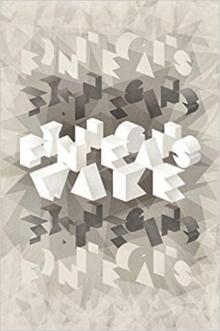 Penguin Classics the Restored Finnegans Wake
Penguin Classics the Restored Finnegans Wake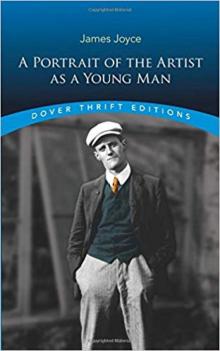 A Portrait of the Artist as a Young Man (Dover Thrift Editions)
A Portrait of the Artist as a Young Man (Dover Thrift Editions)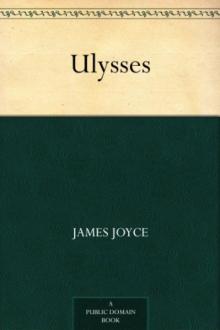 Ulysses
Ulysses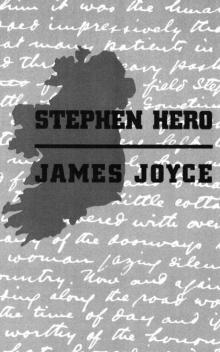 Stephen Hero
Stephen Hero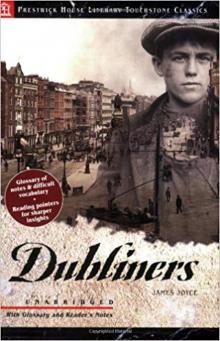 Dubliners
Dubliners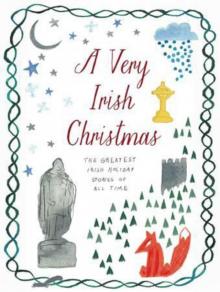 A Very Irish Christmas
A Very Irish Christmas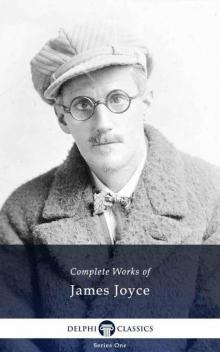 The Complete Works of JAMES JOYCE
The Complete Works of JAMES JOYCE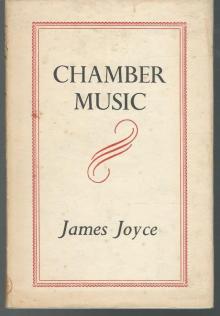 Chamber Music
Chamber Music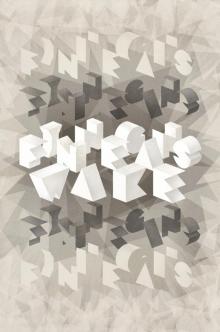 The Restored Finnegans Wake
The Restored Finnegans Wake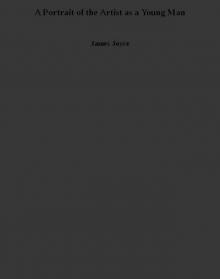 A Portrait of the Artist as a Young Man
A Portrait of the Artist as a Young Man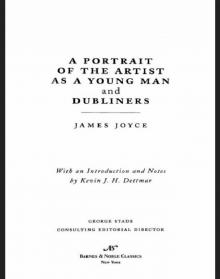 Portrait of the Artist as a Young Man and Dubliners (Barnes & Noble Classics Series)
Portrait of the Artist as a Young Man and Dubliners (Barnes & Noble Classics Series)